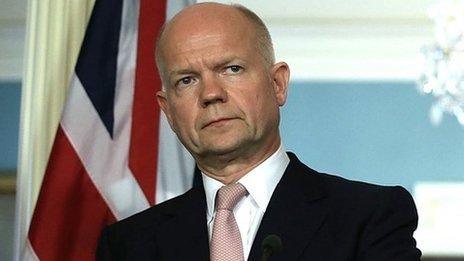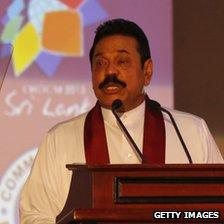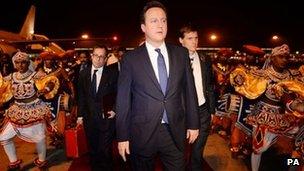William Hague believes Sri Lanka war crimes inquiry can be set up by March
- Published

Mr Hague made the comments while attending the Commonwealth summit in Sri Lanka
UK Foreign Secretary William Hague has said he believes it is possible for the Sri Lankan government to establish a war crimes inquiry before March.
It comes after PM David Cameron called on president Mahinda Rajapaksa to set up an independent inquiry into alleged war crimes - or face a UN probe.
Sri Lanka's government has rejected Mr Cameron's call for an international inquiry.
Sri Lanka's own process has started but will take some time, Mr Rajapaksa said.
Mr Hague made the comments to the Colombo-based Sunday Times, external while attending the Commonwealth summit in Sri Lanka.
Mr Hague told the paper that it was possible for the Sri Lankan government to establish an inquiry before next March "to start and show the world they are doing that".
"That would make a big difference," he said.
Responding to questions from journalists after Mr Hague's statements, Mr Rajapaksa said the process had been started but would take longer than a few months.
"We have to oblige and we have to respect our constitution. So we will be doing it," he said.

Mr Rajapaksa said the process had been started
"The process has already been started. So it will take time. This is what I said. This is not a thing that you can start today and finish it tomorrow.
"The conflict was there for...the war was going on for 30 years."
He continued: "Whether it is Muslims who had been displaced, the Sinhalese who had been displaced, and Tamils, they are all my people, my citizens.
"I have to look after them. So I will do it. But you can't say tomorrow, do it within one week or three months or four months.
"That's very unfair."
Sri Lanka faces continued allegations over the rape and torture of detainees, enforced disappearances of activists and the intimidation of journalists.
The abuses are alleged to have been committed mainly against Tamils since the end of the war in 2009.
The Sri Lankan government has vehemently denied all such accusations.
'No moral right'
Mr Hague and Foreign Office Minister Hugo Swire earlier met with several groups involved in the monitoring and reporting on human rights abuses in the country.
The Foreign Office said Mr Hague had asked them about the current situation on the ground and what more the UK can do to support them.

David Cameron called on Mr Rajapaksa to set up an independent inquiry
Charles Haviland, BBC correspondent for Sri Lanka and the Maldives, said the summit, aimed at showing off the island's post-war economic recovery, has been dominated by a row with Britain over human rights and war crimes allegations.
Mr Rajapaksa had earlier reacted defiantly to the UK's call for an inquiry into alleged human rights abuses, saying "people in glass houses shouldn't throw stones".
Pro-government commentators have pointed to alleged abuses under British colonial rule to suggest Britain has no moral right to criticise Sri Lanka.
Mr Rajapaksa made an oblique reference to Bloody Sunday, when 13 civilians were shot dead in Northern Ireland by the British army in 1972.
In May 2009 Sri Lanka's army defeated the separatist Tamil Tigers after almost 30 years of brutal and bloody civil war. But the spotlight has focused on the final phase of that war as civilians were hemmed into a thin strip of land on the north-eastern coast - both sides are accused of atrocities here.
However, one UN report estimates that as many as 40,000 civilians were killed in that final phase, mostly by government shelling.
- Published16 November 2013
- Published16 November 2013
- Published16 November 2013
- Published15 November 2013
- Published15 November 2013